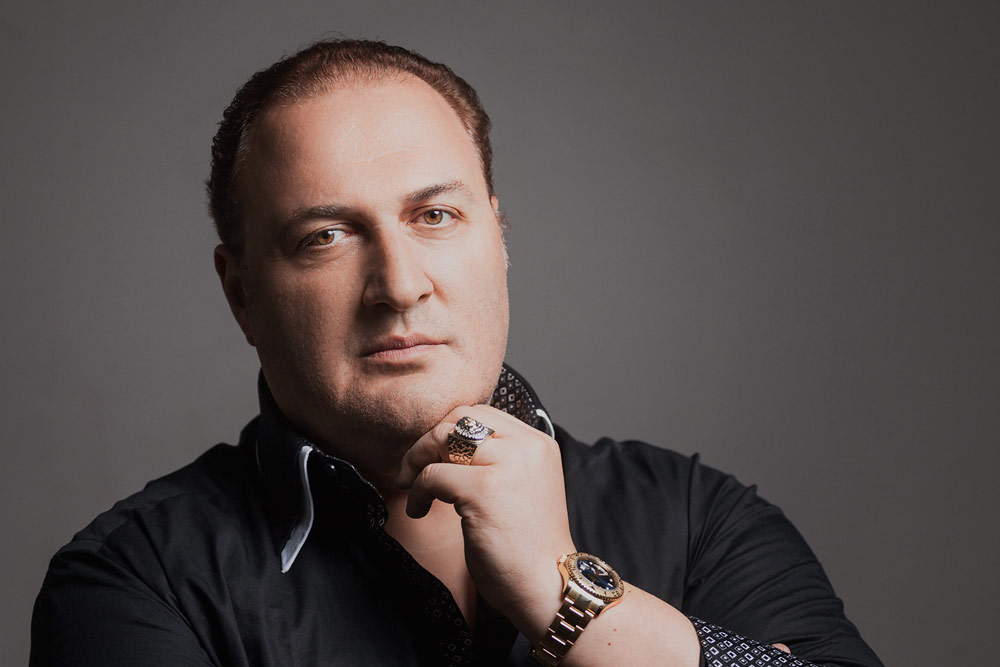
Talking with singers: George Gagnidze
InterviewRoles like Rigoletto, Simon Boccanegra, and Scarpia in Tosca are what fill the calendar of Tbilisi-born baritone George Gagnidze. He is currently in San Francisco, singing Amonasro in Francesca Zambello’s new production of Aida; next season, he reprises Amonasro at the Metropolitan Opera, before heading to Deutsche Oper Berlin to sing Carlo Gérard in Andrea Chénier, and Scarpia in Tosca.
Gagnidze spoke about what helps him stay fresh with his signature roles, how studying Mussolini helped him play a more convincing villain.
How do you keep roles fresh as you sing them in various productions?
There are some roles such as Rigoletto or Scarpia in Tosca that I’ve sung a lot of times now. Even if the vocal approach always remains the same, the outcome of each performance depends on the colleagues with whom I am performing, the production and especially on the conductor, and this ever-changing combination of factors is what helps me keep my roles fresh. Also, I constantly try to delve deeper and deeper into my roles, both vocally and dramatically. As I’m becoming more mature as a singer and as an artist, my roles are developing, too. Even roles I’ve sung a lot - there always is something new to discover.
Are there any roles with which you have a particular connection, and why?
One role I have a particular connection with is for example Amonasro in Aida, a role I’ve sung very often. At the moment I’m singing it at the San Francisco Opera and in March and April I’ll sing it at the Met again. Like myself, he is from a small country bordering a great power, and - just like myself - he loves his country.
Another one I truly love is Simon Boccanegra. Though I haven’t performed it often, I find it particularly moving. He is a very positive character who loves his country and his family and also vocally he is a dream to sing. Then there are two roles that have been important throughout my career: Scarpia in Tosca that I’ve sung for my New York debut at the Avery Fisher hall in 2008 and later in Luc Bondy’s new production conducted by James Levine, and for the HD cinema broadcast in 2010.
And of course Rigoletto, a key role in my career. I sang the aria when I won the “Voci Verdiane Competition”, and subsequently sung it in many important opera houses, including for my debut at the Met in the old Otto Schenk production and later in the new one by Michael Mayer.
What’s the trick to playing a villain?
I think the main trick is to try to understand these characters as deeply as possible. When I learn a new role I always read the literary source, and try to read anything I can find about the characters in order to “get to know them” in the best and possibly most profound way. Most villains such as Macbeth have a very human core and I try to emphasize this side of the character; they are human beings who repent their actions. In the case of a role such as Scarpia it is more difficult of course. In order to play him as convincingly as possible I’ve even studied the biographies of men of power such as Mussolini and watched documentaries in order to study their facial expression, body language and way of talking.

What advice do you have for young baritones and basses, who may have to wait longer before they are vocally ready to sing the roles that will fit them best?
My advice is to begin with more lyric roles, possibly Mozart and not immediately with dramatic roles, and this particularly when someone has a lyric voice to begin with. The tendency nowadays is for lyrical voices to take on dramatic roles, Wagner, Verdi and Strauss when they should sing Mozart. Just a few days ago a young baritone sang for me and asked me for my advice. A beautiful voice, but he was very young. He sang Amonasro for me and told me his wish is to sing Wagner. I suggested he should study the Count in Le nozze di Figaro, Don Giovanni and Papageno for now. Then the voice will develop… It’s not good for your voice and your career if you begin with Wagner. I didn’t sing dramatic roles until I was 32; the first 10 years of my career I was singing more lyrical roles in order to develop my technique before sinking my teeth in the more dramatic Verdi or verismo roles.
Why do you sing professionally?
Basically because I love singing and I love my job. There is nothing better than being able to make people happy and I enjoy making people forget about their everyday problems with my art.
Aida has two more performances at San Francisco Opera. For details and ticket information, click here.


Comments